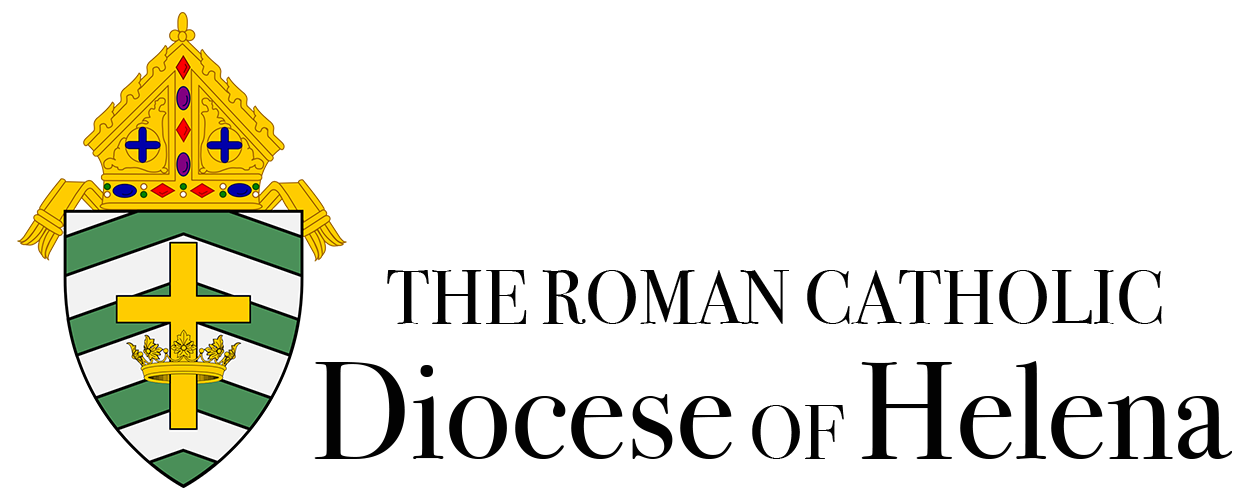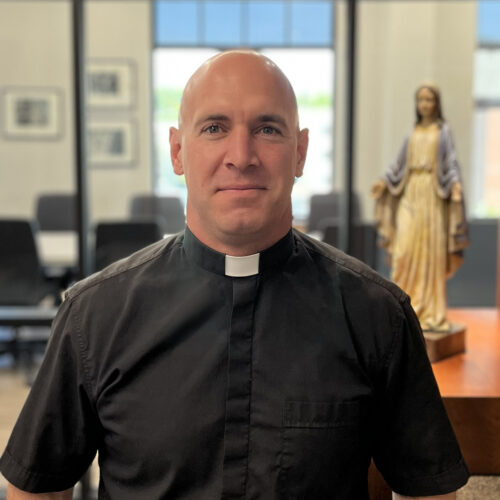What Is a Diocesan Priest?
A priest who commits himself to and is ordained for service of God’s people in a definite geographical area (a diocese) is called a diocesan priest. A priest of the Diocese of Helena would expect to minister somewhere within the 23 western and northern counties in Montana which make up our Diocese.
In addition to serving the day-to-day needs of people in parishes, diocesan priests may also serve in a variety of other capacities such as campus ministers, teachers, chaplains for hospitals or prisons, or in diocesan administration.
Why Should Someone Want To Be a Priest?
Everyone looks for a meaning and fulfillment in life. For a Catholic, life’s meaning must have a relation to serving God. As a man grows in the Catholic Christian life and in a relationship with God, he discovers his purpose and place in God’s plan. As a result some men feel called to a special kind of service to Jesus, serving the Catholic Church as its leader in prayer, worship, and service.
What Does a Priest Do?
The Ministry of each priest depends somewhat upon his particular interests and skills and the needs of the Diocese of Helena. A diocesan priest spends much of his time preparing for and celebrating the sacraments (Eucharist, Reconciliation, Baptism, Marriage, Sacrament of the Sick, Confirmation).
Each day some time is set-aside for personal, private prayer. Visiting the sick, visiting people in their homes and working with the various parish and neighborhood organizations are all part of his ministry. The parish priest must also be available to people when they have special needs. He is also a spiritual leader in the community. Along with his parishioners, he addresses issues that touch all members of the community, particularly those who are abandoned and forgotten. He is frequently involved in individual counseling (marriage problems, parent-teenager problems, drug problems or just life in general).
Priests who are pastors are responsible for all ministry provided by the parish and for the administration of the parish. Like anyone else, a priest must also find some time for rest and relaxation when he can do things he enjoys.
Who Can Become a Diocesan Priest?
A single man with average intelligence, emotional stability, good health and sincere interest in serving God’s people may qualify for the priesthood. He must have a sincere interest in people and a true love of the Roman Catholic Church and its teachings, as outlined by the Second Vatican Council and subsequent official Church documents. He should also be a person who is generous and looking for the challenge that comes in following the Lord Jesus Christ and His Church.
How Long Does it Take to Become a Priest?
For a man considering the possibility of priesthood he must ultimately receive a bachelor’s degree and a graduate theology degree. The exact requirements are tailored to the situation of the individual but generally involve the candidate receiving substantial education in philosophy and theology, much of which is obtained at the seminary.
In the Diocese of Helena, our seminarians attend a theological seminary for five years to receive the post-undergraduate training. This time includes four years of classes plus a year of pastoral training (similar to a practicum), usually in the middle of the seminary time. The years of training include significant times of discernment about the vocation to priesthood. Following this time of preparation and discernment, the Bishop may call the candidate to Ordination.
The entire process takes from 5 to 7 years after the candidate finishes college, since some will need to acquire the required classes in philosophy and/or begin discernment of a priestly vocation (especially if they are moving from another field of employment). While this seems like a long period of time, it is similar to preparing for other professions. Our purpose is to fully prepare a man to minister to the people of the Diocese of Helena.
What Are the Programs Available For a Man Considering the Possibility of Priesthood?
If you are in high school or will be entering college soon, the Diocesan Vocations Director is prepared to help you explore the possibility of priesthood while attending college and assist you in directing your class selection and spiritual life toward discerning priesthood.
If you are already enrolled in a college or graduate school and would be interested in a Discernment Program, you may contact the Vocation Director listed below.
If you are a man older than college age and are considering the priesthood then you can also contact the Vocation Director. The Diocese does have programs for older men who are seriously reflecting upon the Lord’s call to priesthood.
In any event, it always is good to speak with one of the priests in your parish about your interest.

